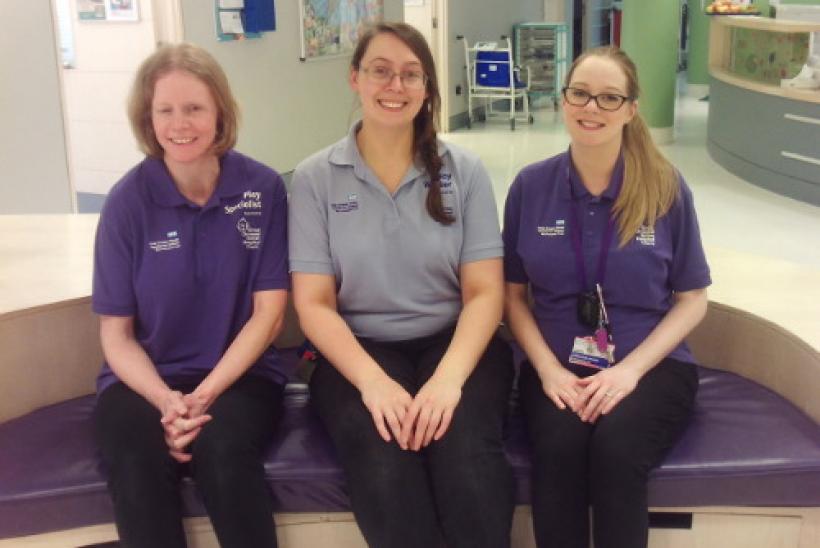Happiness in hospitals help patients in speedy recovery - Q&A
Q: Why is it important to promote happiness in hospitals?
Play and happiness is especially important in a hospital as it makes children and young people (CYP feel at home, and easing anxieties will promote a positive patient experience and will aid in a speedy recovery. Also in line with Article 31 of the United Nations Convention on the Rights of the Child (UNCRC) (UNICEF n.d.), children and young people under the age of 18 years should have opportunity to play and join recreational and artistic activities, a commitment that is vital even if a child is being treated in hospital.
Q: In your role as a Healthcare Play Specialist (HPS), how do you promote happiness in hospitals?
Great Ormond Street Hospital (GOSH) is committed to putting “The Child First and Always” (Great Ormond Street Hospital for Children NHS Foundation Trust 2017), as a HPS we relieve anxiety by providing normalising play and therapeutic play activities, such as arts and crafts, sensory play and medical play. By doing this we allow the child to make informed choices and control around their medical care and procedures. We also have a responsibility to provide an age and stage appropriate play environment in the play room and at the patients’ bedside in accordance to the Healthcare Play Specialist Education Trust (2015).
Q: Tell us about your role as a HPS at GOSH.
There are four International and Private Patient (IPP) wards that are covered by members of the Play Team, which includes HPS’ and Play Workers. The role is varied due to the different specialities of the patients and their admission length. Our role is to use play to prepare children for an array of procedures and to provide distraction during these procedures. We work alongside the large Multi-Disciplinary Team (MDT) to provide the best care for the child.
Q: How is specialised play different to general play?
A HPS provides specialised therapeutic play for a variety of reasons. We can help make sense of a patients ‘condition or treatment by using medical and clinical play to act out hospital experiences. An example of this could be placing a nasogastric tube or cannula on a doll a teddy bear with the patient to understand experiences they have had or may be having whilst in hospital. Through assessment, we use play to maintain and further their development whilst in a hospital setting. General play is used by both the HPS and Play Workers to normalise their environment and experiences. This will consist of play activities that they enjoy at home or their usual surroundings, and can involve messy play, construction toys and role play. General play is usually child led, whereas specialised therapeutic play has a purpose.
Q: How is working as a HPS different in IPP?
As the title implies, we work with a lot of patients from overseas, with the majority travelling from the Arabian Gulf. The basis of play is generally understood as play is its own universal language (Play Scotland 2017). We make assessments on a daily basis; these assessments allow us to make informed choices in regards to developmentally appropriate play for each patient.
Q: What areas of the child’s health does play help most with?
The World Health Organization (WHO) (2014) defines health as a “state of complete physical, mental and social well-being and not merely the absence of disease or infirmity." However, as play providers we know that this is not the whole picture and we also meet the patients’ environmental, emotional and spiritual health.
- Physical Health – we have links with Physiotherapists and Occupational Therapists to help CYP to achieve their goals, for example; standing, walking and fine motor skills.
- Mental Health – play helps CYP to reduce anxieties that they may have from being in a new environment.
- Social Health – this is how we relate to others and form relationships, this can be done through group work, interacting with the patients’ peers and taking part in activities e.g. Hospital School, Activity Centre and Young People’s Forum (YPF).
- Environmental Health – play areas on each ward should promote the happiness and the healing process. The National Association of Health Play Specialists (NAHPS) (2013) says that play areas on wards should be safe and inclusive for all patients, parents and siblings. Within IPP, we do not have a designated sensory space, but are fortunate to have portable sensory trolleys to transform their bed space into a sensory environment.
- Spiritual Health – as HPS’ we celebrate all cultural festivals with activities on the ward. This can then be developed with individual patients to embrace their identity in their world.
- Emotional Health – is about being happy, self-confident, self-aware and resilient (Help Guide n.d.). We believe this links to all the other aspects of health as laughter is the best medicine and promotes happiness.
Q: What benefits have you seen first-hand from therapeutic play?
We see the benefits of therapeutic play every day by seeing responses from patients that have enjoyed our play service either through group play, individual sessions or specified therapeutic play techniques. We also receive feedback forms from patients and families.
Q: How can Play Specialists support parents who have an ill child?
At GOSH, we believe that the child comes first and always (Great Ormond Street Hospital for Children NHS Foundation Trust 2017), and with that in mind, the people that know them best are their parents. When patients are admitted in IPP, we make sure we involve the parents in their child’s play to ensure that they are aware of the play strategies we use; and they allow us to understand the child’s needs and inform us of their child’s likes and dislikes. We are one team in regards to the child’s overall health, wellbeing and happiness.


